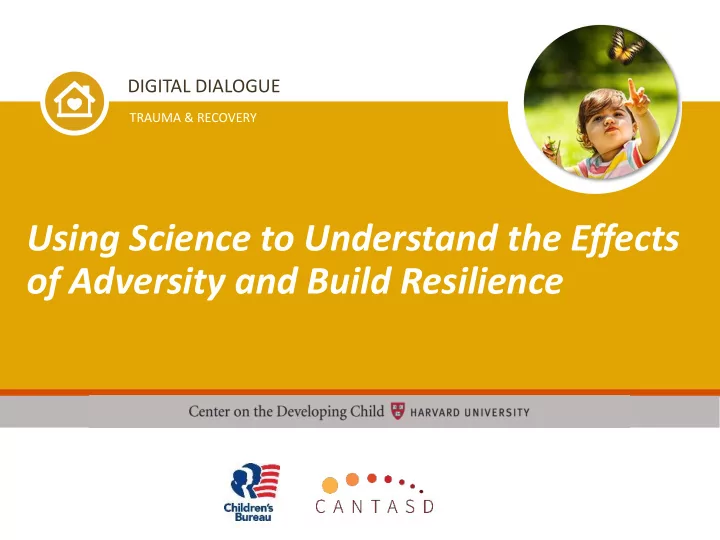

DIGITAL DIALOGUE TRAUMA & RECOVERY Using Science to Understand the Effects of Adversity and Build Resilience
Speakers Join the National Conversation PRESENTER on Child Abuse Jack P. Shonkoff, M.D. and Neglect Julius B. Richmond FAMRI Professor of Child Health and Development, Harvard T.H. Chan School of Public Health and Harvard Graduate School of Education Professor of Pediatrics, Harvard Medical School and Boston Children’s Hospital Director, Center on the Developing Child at Harvard University MODERATOR Nilofer Ahsan Lead, Knowledge & Partnerships cantasd.acf.hhs.gov CANTASD
21st-Century Science Offers a Compelling Platform for Science-Informed Innovation at the Front End of Child Welfare Join the National Effective learning, Conversation resilience, and lifelong on Child Abuse physical & mental and Neglect health Stressors Parents Black Genes Box Supports School failure, risky behaviors, chronic illness, and shorter lifespan cantasd.acf.hhs.gov
The Biology of Stress Explains How Adversity Gets Under the Skin and Affects Development Join the National Conversation on Child Abuse and Neglect cantasd.acf.hhs.gov
Understanding Individual Variation: Why Do Some Children Overcome Hardship While Others Do Not? Source: Noble et al. (2007)
Resilience Can Be Strengthened by Supportive Relationships and Skill-Building Supportive community Responsive services relationships Increasing Faith and sense of cultural mastery traditions Strengthening adaptive skills
Science Could Be Leveraged to Guide Better Timing of Interventions: Early Life Stress Can Accelerate the Maturation of Fear Circuits Early Maternal Separation Plasticity Normal Development Age Source: Callaghan & Richardson (2012)
Matching Services to Needs Requires Rethinking the Definition of an Evidence-Based Program Join the National Conversation on Child Abuse and Neglect What We Should Ask: Why did this work so well for these children and families? Current Approach Significant mean effect earns evidence-based status 0 Why did this work so poorly for these children and families? cantasd.acf.hhs.gov
Matching Services to Needs Requires Rethinking the Definition of an Evidence-Based Program Join the National Conversation on Child Abuse and Neglect Scale effective strategies for similar subgroups Build a suite of programs and policies across sectors that matches different strategies to different resources, needs, and outcomes Design and test new approaches for these subgroups cantasd.acf.hhs.gov
A Vibrant and Increasingly Effective Field Requires a Full Spectrum of Engagement Meeting standards and Delivering state of increasing access the art interventions Adapting and scaling promising new strategies in existing systems Basic quality Generating and issues that must testing new be addressed approaches and policies across sectors (Adapted from Everett Rogers, Diffusion of Innovations, 2003)
Join the National Conversation on Child Abuse and Neglect Discussion • Please type questions into the chat box. cantasd.acf.hhs.gov
Making the Science Actionable: A Master Session April 25 at NCCAN Building on the science you’ve learned Join the National Conversation today, this NCCAN Master Session will on Child Abuse pull out three simple science-based and Neglect principles you can use to design better practices and policies in child welfare… … so you can identify areas for action that have the greatest potential to increase impact for young children and their families! April Ap il 24 24 – 26, 20 2019 19 NCCAN Live-Streamed Sessions • 3 Plenary Sessions • 6 Master Sessions cantasd.acf.hhs.gov • https://nccan.acf.hhs.gov
Join the National Conversation on Child Abuse and Neglect www.developingchild.harvard.edu @HarvardCenter cantasd.acf.hhs.gov
Thank You & Next Steps Join the National • Download the handouts to learn Conversation Upcoming: more. Click on the files in the on Child Abuse “Handouts” box on your screen. and Neglect March 20: Are the Words "Toxic Stress" Toxic? Re-thinking the • Do you have innovative ideas, Narrative About Early questions or concerns about Life Stress trauma and resilience? Tell us April 11: Workforce about your work. Send an e-mail Well-being — Centering to hello@CANTASD.org with Yourself to Better “Trauma and Resilience” in the Support Others subject line. April 17: Integrating Mindfulness to Support Well-Being cantasd.acf.hhs.gov and Resiliency
Recommend
More recommend